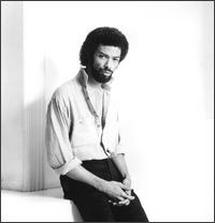
Gil Scott-Heron was born in Chicago, Illinois in 1949, but was sent by his parents to Tennessee to be raised by his maternal grandmother. When Lillie Scott passed away, the 13 year old Gil moved to New York City with his mother. Even at this age, Scott-Heron’s writings were impressive enough to earn him a full scholarship to the private Fieldstone School. Gil then attended Lincoln University, though he left after two years to focus on writing. After a pair of beat novels and a book of poetry, Gil teamed with Brian Jackson, whom he’d met at Lincoln, to put some of his poetry to music.
It was late 1969, early 1970. A turbulent time, both exciting and tragic. The Civil Rights movement and the assassination of Martin Luther King. The Viet Nam War, The Sexual Revolution, Woodstock and the assassination of Robert Kennedy. Man on the Moon and Nixon in the White House. “Small Talk At 125th and Lenox”, Scott-Heron’s debut album, captured all of this brilliantly. “The Revolution Will Not Be Televised”, “Evolution (And Flashback)”, “Whitey On The Moon”, and “Who’ll Pay Reparations On My Soul?" were just some of the unforgettable tracks on that first album.
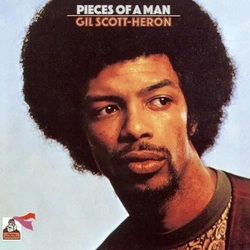
I saw my daddy greet the mailman
And I heard the mailman say
“Now don’t you take this letter to heart now Jimmy
Cause they’ve laid off nine others today”
He didn’t know what he was saying
He could hardly understand
That he was only talking to
Pieces of a man
I saw the thunder and heard the lightning
And felt the burden of his shame
And for some unknown reason
He never turned my way
In spite of a reprise of “The Revolution Will Not Be Televised”, “Pieces Of A Man” was a far less political album than its predecessor, focusing instead on very personal reflections on every day living—both the good and the bad. As the years have passed, “Pieces Of A Man” has been recognized as one of the most "essential" albums of all time and a foundation for what would become Rap and Hip Hop. The album has been sampled by everyone from Salt-N-Pepa to Kanye West.
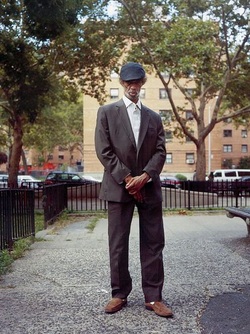
"The First Minute Of A New Day" was Scott-Heron's first for a major label (Arista), featured The Midnight Band, and became a must-own piece of vinyl on college campuses across America. With pieces ranging from "Guerilla", "Ain't No Such Thing As Superman", and "Pardon Our Analysis", the album became not only a tremendous critical success but also a strong seller, charting on the R&B and Pop album charts and rising to number 5 on the Jazz album charts.
The song "Johnannesburg" led off and carried Scott-Heron's next album, "From South Africa To South Carolina" and the double-LP "It's Your World" (featuring "Bicentennial Blues" and a 13 minute live jam on "The Bottle") kept Gil high on critic's lists, though sales for the artist were leveling off. 1977's "Bridges" was a huge favorite among fans and featured the now iconic anti-nuke anthem "We Almost Lost Detroit", but failed to find a wider audience. A couple of my favorites, "Secrets" and "1980", were also modest sellers and the critics were unimpressed. After three more albums, Arista dropped Scott-Heron. He continued touring, for a while, and then became something of a recluse. There would be only 2 more studio albums from Gil Scott-Heron from 1985 to his death this year, but they are two well worth the journey. 1994's "Spirits" is a jazz tour de force, while "I'm New Here", released in 2010, is a powerful epitaph for a giant of a man. An interview with Gil, featuring intimate performances of his music, was filmed in 2010 and is expected to be released some time later this year.
Often credited as "The Godfather of Rap", Gil Scott-Heron said bluntly, "I don't know if I can take the blame for it." Scott-Heron did admit to listening to rap music, because "I have kids... But I would not say its aimed at me. I listen to the jazz station."
Gil Scott-Heron never recorded a Christmas or holiday effort, though some of his pieces work very well in the proper context and I have used "Winter In America" in a mix, here and there. He was a major influence on my musical taste and I dig the man's life philosophy as well. "If someone comes to you and asks for help and you can help them, you're supposed to help them. Why wouldn't you?"
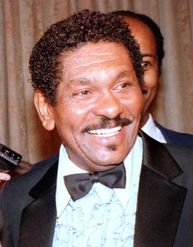
Born in Tyler, Texas in 1928, Gardner's family was poor and Texas, in those days, was largely segregated. Gardner remembered Tyler as "its own special kind of hell." Singing from the age of 5, Gardner couldn't wait to leave that Texas town. Gardner believed he was destined to be a singer. Following a short stint in the Army, Carl traveled to California in search of his dream, leaving a wife and baby daughter behind.
In California, Gardner joined up with Bobby Nunn to form the heart of the R&B group The Robins. The Robins recorded for Spark Records, a label founded by the songwriting team of Jerry Leiber and Mike Stoller. For the Robins, Leiber & Stoller wrote such classics as "Riot In Cellblock #9", "Framed" and "Smokey Joe's Cafe". "Smokey Joe's Cafe" sold well enough to get Leiber & Stoller a deal with Atlantic records and they convinced Gardner and Nunn to come with them. Gardner and Nunn officially formed The Coasters in 1955.
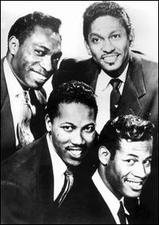
The Coasters were inducted into the Rock And Roll Hall of Fame in 1987. Gardner became a strong advocate for legislation protecting groups from having their identities appropriated by bogus copy cat outfits; at one time, there were several groups performing under the name of "The Coasters" even though Gardner owned the rights. "I started the group," said Gardner, "I'll be damned if I'm gonna let someone steal it from me."
The Coasters finally recorded a Christmas song in 1993. Their version of "Frosty The Snowman" appeared on the out-of-print CD "Rock & Roll Christmas" on the I-Spirit label that year and is currently available as a download through Amazon MP3 and other digital outlets. The Robins 1950 Christmas record (released as by the Nic Nacs), "Gonna Have A Merry Christmas", was recorded before Gardner joined that group.
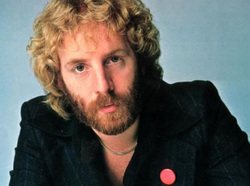
Gold was an accomplished player of multiple instruments and is featured on the records of Linda Ronstadt, Art Garfunkle, Eric Carmen, 10 cc, and Jackson Browne, among others. Gold wrote hits for Trisha Yearwood, Leo Sayer, Wynonna Judd and Celine Dion, to name a few. Gold was also a successful producer, arranger and engineer. He frequently worked with Stephen Bishop as well and managed to record with all of the former Beatles except George Harrison.
Gold's music of holiday interest begins with the 1996 album "Halloween Howls". It's said to be a favorite of Doctor Demento and, though it clearly caters to the children's market, it's spooky holiday fun for kids of all ages. In 2001, Gold produced a children's Christmas album, "Sugar Beats Christmas". And, in 2008, Gold finally got around to recording a pair of Christmas tracks as a digital single, John Lennon's "Happy Xmas" and the Beach Boys' "Little Saint Nick". "Happy Xmas" found its way to hard copy CD that same year as part of "Santa's Rock N Roll Christmas Party".
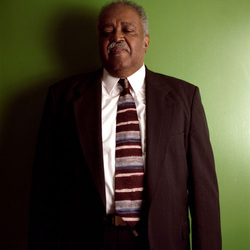
Ray Bryant was born in Philadelphia and, as a young man, played the jazz clubs with his brother Tommy on bass. The Bryant brothers became regulars at Philly's Blue Note, a stopping point for all the top jazz names of the era. Bryant impressed visiting artists sufficiently that he soon had plenty of work as a sideman with artists like Miles Davis, Sonny Rollins, and Milt Jackson. By 1955, his name shared billing with a legendary singer on the album "Meet Betty Carter and Ray Bryant". After that, Bryant fronted his own unit, The Ray Bryant Trio, which recorded brilliant jazz for decades. Hardcore jazz fans favor Ray's solo piano work.
Bryant was noted for bringing sophistication to be-bop and simmering liberally in blues and gospel. Songs such as "Blues Changes" have been tremendously influential in the genre and beyond. Many of his best tracks were completely improvised, with no sheet music or lead sheet to follow. Ray scored a Top 40 hit in 1960 with the novelty "The Madison Time" and his version of "Ode To Billie Joe" also charted in 1967.
Bryant performed several Christmas songs for NPR's long running Jazz Piano Christmas series, two of which ("God Rest Ye Merry Gentlemen" and "Joseph Dearest, Joseph Mine") were included on the out-of-print album of the same name. Ray's solo take on "Greensleeves" from the album "Alone At Montreaux" is readily available as a download through Amazon MP3.
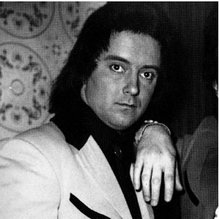
Buddy Gask left Showaddywaddy in 1987. He was "fired" when his drinking and clashes with the other members became too much for the rest of the band. Guitarist Russ Fields was also tossed for similar reasons. Gask's ongoing difficulties with alcohol took a substantial toll on his health and, in 2005, he retired to Spain where he lived the rest of his days in poor health.
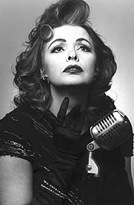
The actress and singer performed in the theatrical cabaret style I most associate with Edith Piaf. Robi built her stardom in the forties by bringing Latin rhythms to North America and translating the songs to French. Robi wrote two autobiographies and the biographical film Bittersweet Memories was released in 2004.
I'm completely unfamiliar with the music of Alys Robi, but a simple search on Amazon did turn up one Christmas track, "C'est Noel Dans Mon Village".
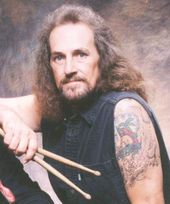
Toler's health had been in decline for a number of years, which kept him from performing or recording extensively in recent times. He does not appear on any holiday records that I'm aware of, but played a pivotal role in shaping the sound of one of rock's greatest eras.
Legendary R&B singer Benny Spellman passed away on June 3, following a long illness. He was 79. Spellman, who was a member of Huey Piano Smith's famous Clowns, is best known for his classic solo sides "Lipstick Traces" and "Fortune Teller" (both written by Allen Toussaint).
Steve Popovich died on June 8 at his Nashville home at the age of 68. A long time Record Executive with Columbia, Steve founded Cleveland International Records in 1976 when he was unable to find another label willing to release Meat Loaf's "Bat Out Of Hell", an album that has since sold over 43 million copies.
Alan Rubin, a trumpet player with the original Blues Brothers band, died of lung cancer on June 8. The 68 year old, who backed artists as diverse as Frank Sinatra and Yoko Ono, was plucked for the Blues Brothers role of "Mr. Fabulous" from the Saturday Night Live band that backed Belushi and Aykroyd during their musical skits on the show.
British producer Martin Rushent passed away on June 4 at the age of 62. Rushent's credits include Fleetwood Mac, The Go-Gos, The Human League, The Stranglers, The Buzzcocks, T-Rex, Yes, Shirley Bassey, XTC, ELP, and Jerry Lee Lewis. In 2010, Rushent produced "Santa's On His Way" for The Pipettes, which is still available as a free download from the group's website.
Finally, I thought it worth mentioning the passing of English songwriter and producer Gordon Lorenz, who died June 5 after a short illness. Lorenz worked with a number of big name stars during his career, from Shirley Bassey to Cliff Richard (a Christmas album, no less) to David Soul to Gloria Gaynor. But most in the UK will remember Lorenz most for the song he wrote that bumped John Lennon out of the top spot on the British charts in 1980, becoming Christmas Number One that year, "There's No One Quite Like Grandma". Before Simon Cowell came along, Christmas Number One was a pretty big deal in the UK. So, even though its not really a Christmas song, we'll close with a video of Gordon Lorenz' biggest hit.
 RSS Feed
RSS Feed

